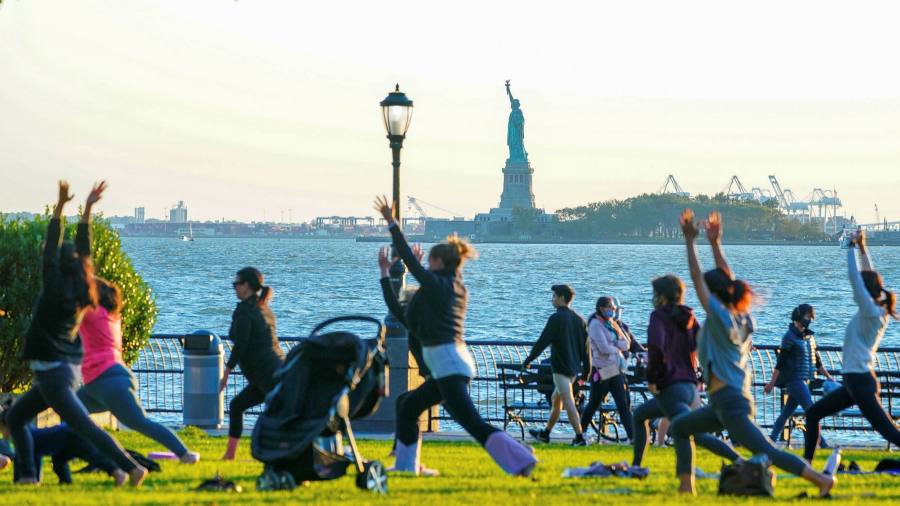[ad_1]
However smooth the ride, tortelloni tend to sag and pucker in a delivery driver’s back seat. Nor would readers in all seriousness want me to perpetrate the medievalism of cooking at home. For these reasons and more, the restoration of indoor dining in the District of Columbia continues to delight. It is of a piece with the general lenience in these parts. There are no queues for the supermarkets at most hours. The toned splendour of my calves attests to the openness of the gyms. And Washington, remember, is not the nation’s loosest jurisdiction. In Miami, there is an air of the Before Times in the catwalks that it pleases locals to call restaurants.
In retrospect, my decision to take a US posting in 2018 has bought me an extra year of normal life. Socially, physically, culinarily, I have known some approximation of business as usual since last summer. To go by the testimonies on my WhatsApp feed, my experience in Britain now would be one of harsher constriction. More things are shut. Queues are commoner. It is still an offence, though rarely punished, to leave home without a “reasonable excuseâ€. And this under a live-and-let-live prime minister. Much lower death-rates would warrant the difference, and then some. The data seem to suggest no such thing.
Short of engaging in Covid-19 arbitrage, whereby the rich roam the globe in search of maximal freedom, my move could not have played out more kindly. But it does leave the awkward matter of whether my own country stands exposed as docile. Even if that judgment is too much, the crisis has at the least revealed different conceptions of freedom.
It comes down, I think, to this. Liberty in the US is overwhelmingly a matter of rules: one’s formal right to do things, whether to bear firearms or keep a gym open. The UK, while steeped in legal freedoms, really specialises in a sort of cultural looseness. That is, freedom from the judgment of others.
To illustrate the difference, consider the right of expression. The US codifies it explicitly in the First Amendment. The UK has not been anything like as declarative for anything like as long. But where would you rather make a risqué joke? Alternatively, take freedom of, and from, religion. The US has no established church. Britain does not just reserve legislative seats for bishops, it has them on the national broadcaster’s morning radio, airing thoughts of unsurpassable fatuity. Still, where would you rather be a non-believer?
I don’t mean to hail norms over laws as the “true†freedom, but rather to delineate the two. If anything, the past year has brought me around to the American emphasis. In a crisis, when the state is ascendant, a folk obsession with legal freedoms is a reassuring thing to have around. I am not the only one who owes a (relatively) high quality of life over the past year to it. Looking back, America was never going to wear UK-grade lockdowns for a UK-type period, unless the health outcomes were provably and astronomically better. Even then, I wonder.
In normal times, there is a lot to commend the British way. It confers most of the same freedoms, without the absolutism that results in a sparse welfare state and gun ownership. (In Max Weber’s definition — a monopoly on legitimate violence — the US does not have a state at all.) There is also that cultural laxity to savour. I know Washingtonians who campaign all day to curb the size and reach of government, only to go home to lives of grinding banality. There is no conceptual problem here (you need not do much with your freedom) but it seems an odd way of passing one’s allotted stint in this vale of tears.
The trouble is that “normal times†are hardly the test. The test is what happens when the state makes a quite exceptional bid for power. Under such duress, Britain’s tolerance of whimsy and weirdness is not quite enough by way of counterbalance. It is the US, with its more literal freedom-worship, such an unsmiling zeal at times, that better withstands the government. I don’t know which is the freer country. I fear I know which is the freer when it matters.
Email Janan at janan.ganesh@ft.com
Best of FT Weekend
High fees and lockdown blues: why students are in revolt

The pandemic has reignited disputes over the cost and value of higher education — and added to the generation wars
Brazil’s new frontier is transforming its fortunes — but at what cost?

The western state of Mato Grosso is riding an agricultural boom, driven by China, faith and Bolsonaro
Follow @FTLifeArts on Twitter to find out about our latest stories first
Listen to our podcast, Culture Call, where FT editors and special guests discuss life and art in the time of coronavirus. Subscribe on Apple, Spotify, or wherever you listen
[ad_2]
Source link






